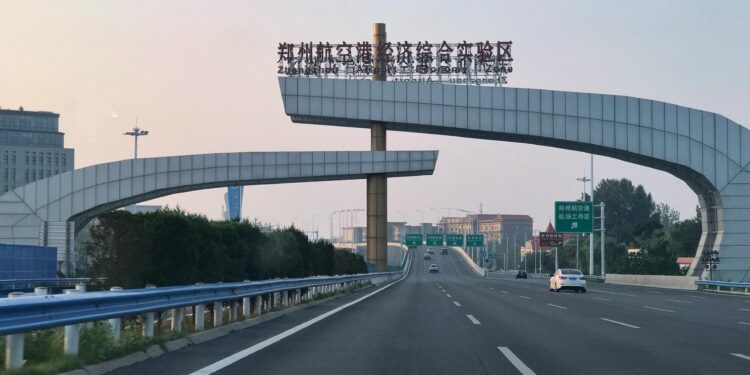The Zhengzhou Airport Economy Zone: A Remarkable Aerotropolis
In an era where global trade and economic growth are increasingly tied to strategic logistics and transportation hubs, the Zhengzhou Airport Economy Zone (ZAEZ) has emerged as a shining example of an innovative aerotropolis. Located in the heart of central China, this ambitious development not only enhances the efficiency of air cargo and passenger transit but also serves as a critical catalyst for regional economic transformation. With comprehensive planning, robust infrastructure, and policies aimed at attracting foreign investment, the ZAEZ is rapidly establishing itself as a key player in the global supply chain landscape. This article delves into the factors that make the Zhengzhou Airport Economy Zone a remarkable model of modern economic development and explores the implications of its growth for local and international businesses alike.
Exploring the Strategic Advantages of the Zhengzhou Airport Economy Zone
The Zhengzhou Airport Economy Zone has emerged as a pivotal hub within China’s economic landscape, showcasing a blend of advanced infrastructure and strategic logistics capabilities. This zone is strategically located at the crossroads of several major transportation networks, making it an ideal site for businesses to thrive. With an ambitious focus on fostering innovation and economic growth, the area offers significant incentives for investments, including:
- Tax Reductions: Companies operating within the zone benefit from favorable tax rates, encouraging both local and foreign enterprises.
- Infrastructure Development: Continued investment in transportation facilities, such as roads, railways, and airways, supports seamless logistics operations.
- Access to Talent: Proximity to educational institutions ensures a steady stream of skilled labor, enhancing operational efficiency.
The government’s commitment to enhancing the zone’s competitive edge is evident through various policies aimed at attracting international operations. Notably, the establishment of specialized industrial parks within the zone provides tailored environments for sectors like e-commerce, logistics, and manufacturing. Additionally, companies benefit from streamlined customs processes and reduced logistics costs, making it a preferred location for businesses looking to optimize their supply chains. The combination of proactive governance, modern infrastructure, and strategic location positions the Zhengzhou Airport Economy Zone as a powerhouse of economic development and a model for future aerotropolis designs.
Innovative Infrastructure and Investment Opportunities in the Aerotropolis
The Zhengzhou Airport Economy Zone is rapidly transforming into a beacon of innovation and economic advancement, driven by strategic investments in its infrastructure. This cutting-edge aerotropolis is designed to facilitate seamless cargo and passenger movement, drawing business investments and fostering growth for logistics and aviation-related enterprises. Key components of this innovative infrastructure include:
- Expanded Cargo Facilities: State-of-the-art warehouses and handling systems.
- Advanced Transportation Links: Integrated road and rail systems for efficient connectivity.
- Smart Technology Integration: Adoption of IoT and AI-driven systems to enhance operational efficiency.
Investment opportunities abound within this thriving economic zone, attracting both domestic and international investors eager to capitalize on its strategic advantages. The zone is equipped to support a diverse range of industries, from e-commerce to advanced manufacturing. Some potential areas for investment include:
| Sector | Investment Potential |
|---|---|
| Logistics and Supply Chain | High demand for warehousing and distribution centers. |
| Technology and Innovation | Growth in AI and smart logistics solutions. |
| Aviation Services | Opportunities in maintenance and support services. |
Sustainable Growth: Recommendations for Future Development in Zhengzhou
The future of Zhengzhou lies in its ability to harness its unique geographical advantages while embracing sustainable practices. To ensure that the growth of the Airport Economy Zone benefits both the economy and the environment, the following strategies should be prioritized:
- Invest in Renewable Energy: Develop solar and wind energy infrastructure to power logistics facilities and manufacturing plants.
- Enhance Public Transportation: Create efficient transit options connecting the airport with urban centers to reduce carbon emissions from individual transportation.
- Promote Green Building Standards: Implement guidelines for new developments that emphasize energy efficiency and sustainability.
- Encourage Sustainable Supply Chain Practices: Partner with companies focused on eco-friendly logistics to reduce the environmental impact of freight operations.
Moreover, fostering partnerships among government, academia, and the private sector will catalyze innovative solutions. A dedicated focus on research and development in logistics technologies can lead to smarter, more efficient operations. The following collaborative efforts should be explored:
| Partnership Type | Potential Benefits |
|---|---|
| Public-Private Partnerships | Increased investment in infrastructure and technology |
| Academic Collaborations | Advancements in air traffic management and logistics research |
| International Alliances | Global best practices and innovation sharing |
Final Thoughts
In conclusion, the Zhengzhou Airport Economy Zone stands as a testament to the potential of modern aerotropolises, illustrating how strategic planning and investment can transform a region into a global logistics hub. With its impressive infrastructure, robust connectivity, and a business-friendly environment, Zhengzhou serves as a model for future developments in urban planning and economic growth. As the world continues to evolve in terms of trade and transportation, the insights gleaned from this remarkable undertaking will inform and inspire similar ventures across the globe. The ongoing developments at Zhengzhou Airport Economy Zone not only signify a significant advancement for China but also herald the future of integrated economic zones worldwide, shaping the next generation of regional economies driven by aviation and logistics. As stakeholders continue to engage with this dynamic landscape, the zone’s story is far from over, promising further innovation and opportunity on the horizon.














